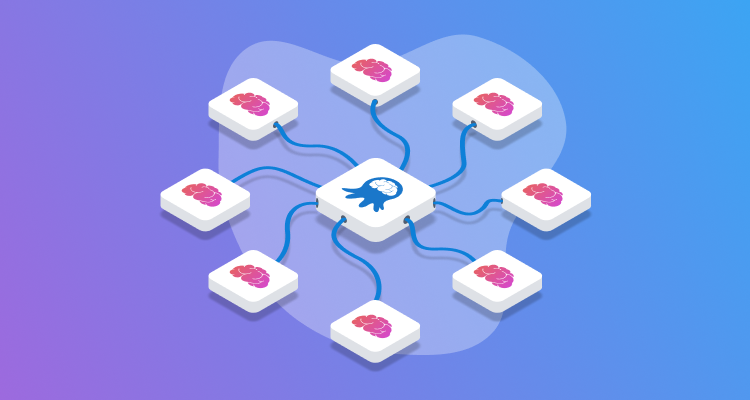Imagine this scenario: An application is built on Monday afternoon. That version is deployed to a test environment on Tuesday morning for verification. Testing is successful, and the production deployment occurs on Wednesday morning. But no one knew that early Tuesday morning a third-party package issued an update that closes a critical CVE. Ideally, a process exists to inform application teams about the vulnerability before testing starts on Tuesday and include it as part of the production deployment on Wednesday.
With Platform Hub, solving that problem at scale is much easier than ever before. In this post, I will walk you through the steps to increase supply chain security in Octopus Deploy using the Process Templates and Policies included in Platform Hub.
Nomenclature
If you read my previous post on supply chain security, you are familiar with SBOMs, Provenance, and Attestations. For those who haven’t read that post, I’ve included the definitions below to make it easier to follow along.
- SBOM - Software Bill of Materials - a list of all the third-party libraries (and their third-party libraries) used to create the build artifact (container, .zip files, jar files, etc.).
- Provenance - the record of who created the software change, how it was modified and built, and what inputs went into it. It shows how the build artifact was built.
- Attestation - A cryptographically verifiable statement that asserts something about an artifact, specifically its Provenance. It is similar to the notary seal on a document. Doesn’t show the whole process, but certifies its validity.
SBOMs, Provenance, and Attestations are intertwined. Think of it like a cake.
- SBOMs are the ingredient list.
- Provenance is the recipe and kitchen log (who cooked it, when, and with which tools).
- Attestation is a signed certificate that proves the ingredient list, recipe, and cooking process are trustworthy.
Responsibilities differences between build servers and Octopus Deploy
This post focuses on using Process Templates and Policies within Octopus Deploy. But they will rely on artifacts created by the build server. For example, the build server will create the SBOM, while Octopus Deploy will scan the SBOM for package references with known vulnerabilities. Below is a table showing the differences in responsibility between build servers and Octopus Deploy.
| Build Server | Octopus Deploy |
|---|---|
| Generating SBOMs | Attaching the SBOM to the release or forwarding it onto a third-party tool like Ortelius |
| Scanning source code referenced third-party packages for known vulnerabilities | Scanning for known vulnerabilities within package versions listed in the SBOM |
| Generating Attestations | Verifying attestations |
| Scanning recently built containers for known vulnerabilities | Scanning containers about to be deployed for known vulnerabilities |
| Create build information file for Octopus Deploy to consume | Use the build information file to update third-party issue trackers like JIRA |
Tooling Used
For my build server, I’m using GitHub Actions because it includes built-in Attestation generation. I’ll use Trivy for vulnerability scanning and SBOM generation.
- SBOM generation - GitHub Actions will use Trivy to create an SBOM in the
spdx-jsonformat via the provided step by AquaSecurity/trivy-action step. - SBOM scanning - Octopus Deploy will use Trivy to scan the SBOM for known fixed vulnerabilities.
- Attestation generation - GitHub Actions will use the built in step actions/attest-build-provenance to create the attestation.
- Attestation verification - Octopus Deploy will use the command
gh attestation verifyprovided by GitHub CLI to verify the attestation. - Container scanning Post-build - GitHub Actions will use Trivy to scan the container for known fixed vulnerabilities after the container is built.
- Container scanning Pre-deployment - Octopus Deploy will use Trivy to scan the container for known fixed vulnerabilities before a deployment.
In Octopus Deploy, I opted for execution containers instead of installing Trivy directly on my workers. There are two execution containers with Trivy installed you can use today:
- octopuslabs/trivy-workertools includes Trivy, PowerShell, Python, and Octopus CLI.
- octopuslabs/github-workertools includes the Git, GitHub CLI, Trivy, PowerShell, Python, and Octopus CLI.
The
DOCKERFILEfor both execution containers is in the WorkerTools GitHub repository.
Process Templates
My Process Template will contain all the necessary logic to attach the SBOM to the release, scan the SBOM for known vulnerabilities, verify the attestations from GitHub, and scan containers for known third-party vulnerabilities.
The Process Template documentation provides a step-by-step guide to creating Process Templates. Instead of a step-by-step guide, I’ll walk you through the specific configuration for my Process Template.
Process Template Configuration
Following our best practices, I created a Process Template focused on supply chain security, Deploy Process - Attach SBOM and Verify Build Artifacts.
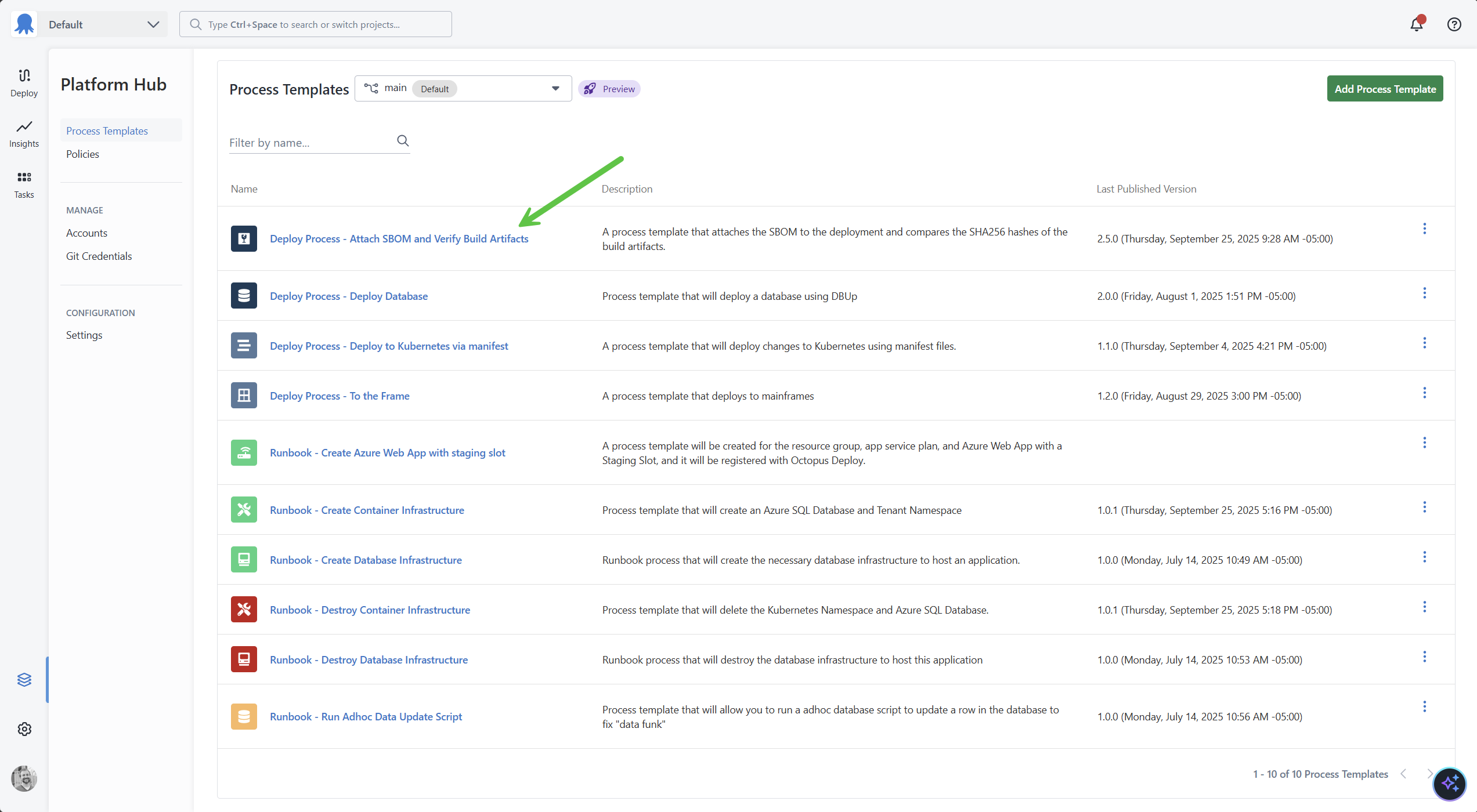 .
.
The Process Template currently has two steps.
- The first step will extract the SBOM from a package, attach it as a deployment artifact, and then run Trivy to scan for known fixed vulnerabilities.
- The second step will loop through a list of packages and containers, run
gh attestation verifyon each item, and run Trivy on any containers for any known fixed vulnerabilities.
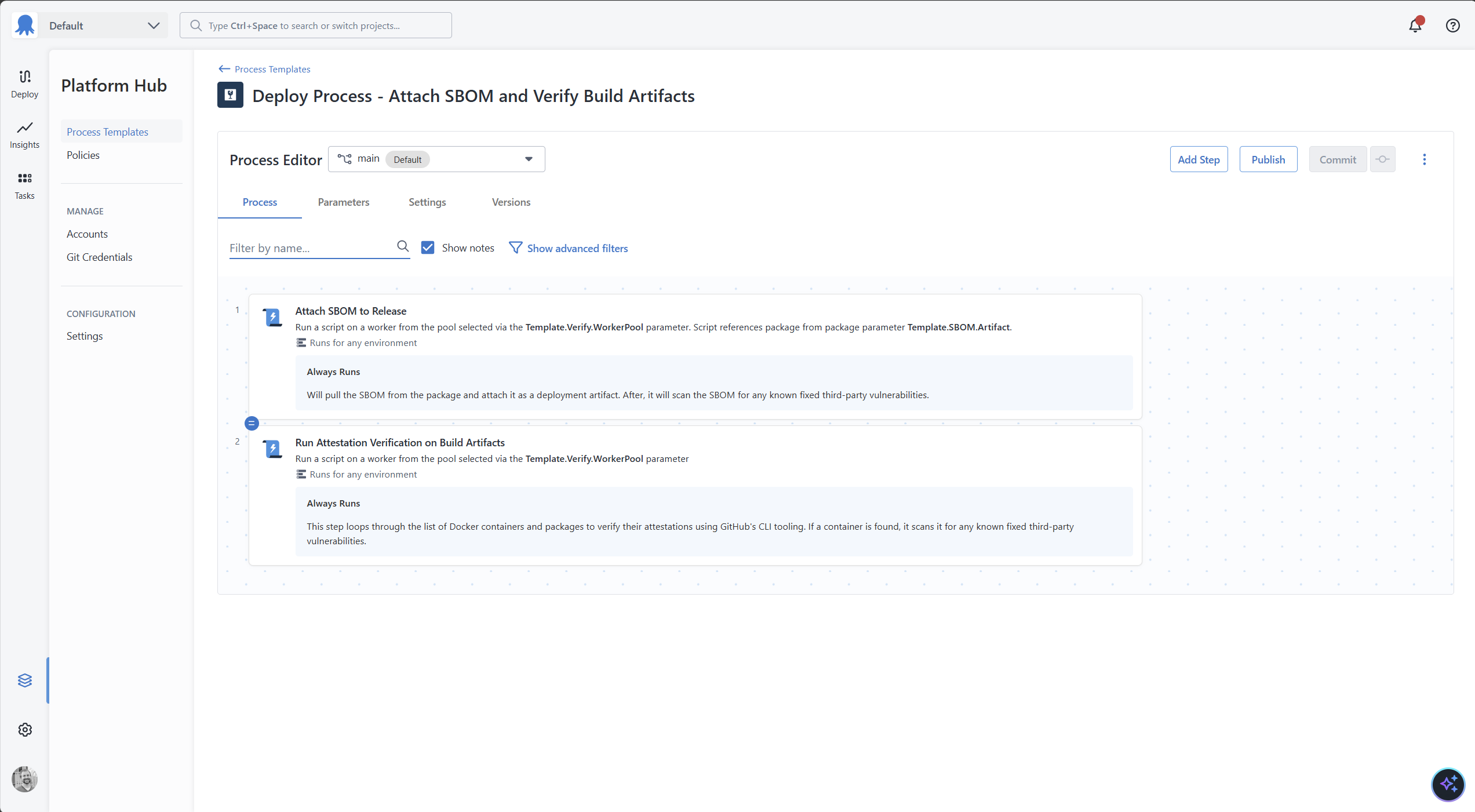
Process Template parameters
For my Process Template, there are four Process Template parameters.
Template.SBOM.Artifact- a zip file containing the SBOM for a specific application.Template.Git.AuthToken- the GitHub PAT used forgh attestation verifyto function properly.Template.Verify.Workerpool- the worker pool to run all the steps.Template.Verify.ExecutionContainerFeed- the container feed for the execution containers.
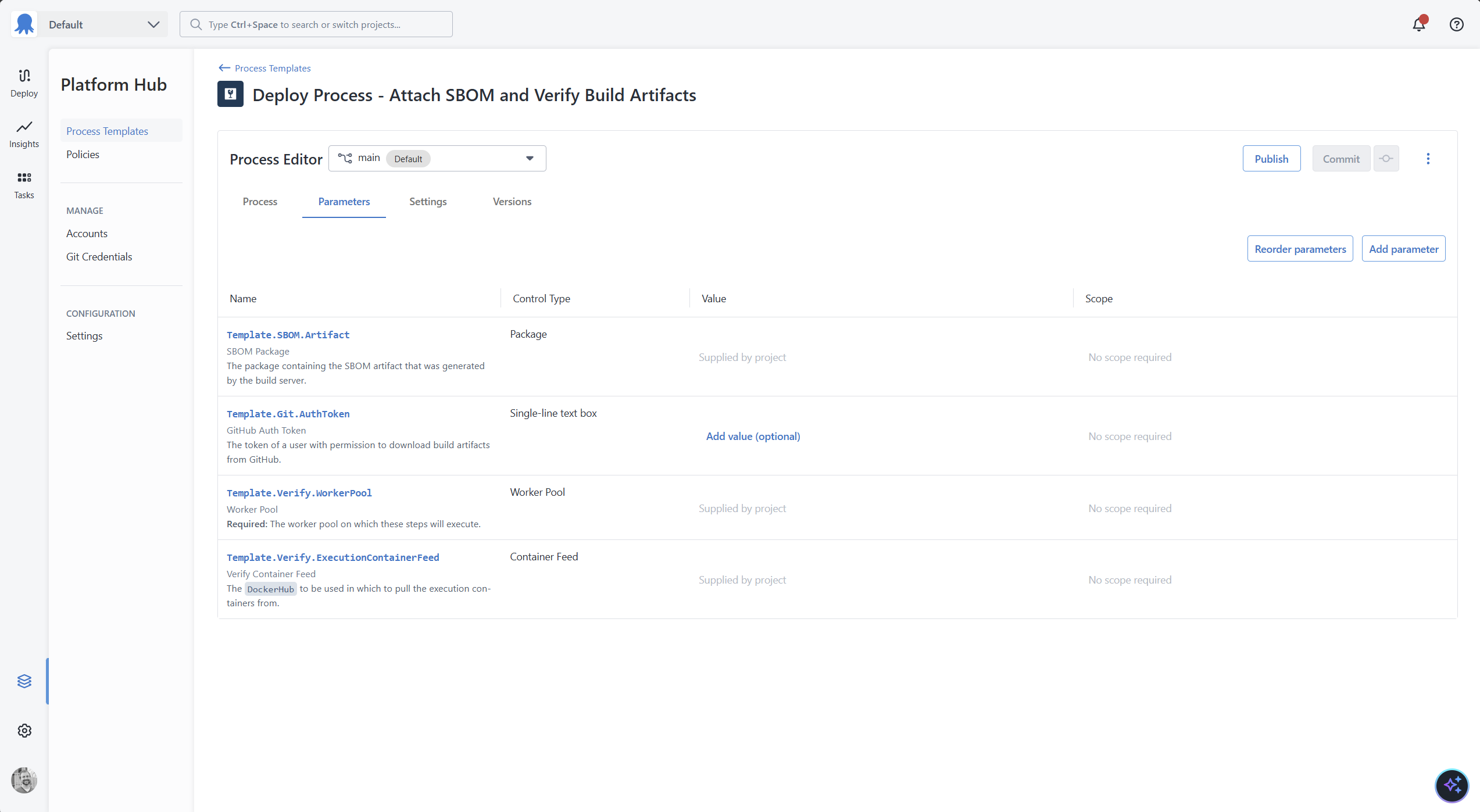
Processing the SBOM
The first step will use the package from the Template.SBOM.Artifact, Template.Verify.Workerpool, and Template.Verify.ExecutionContainer parameters. As a producer of this step, I opted to hardcode the execution container instead of passing it in as a parameter. The consumer shouldn’t need to worry about that configuration.
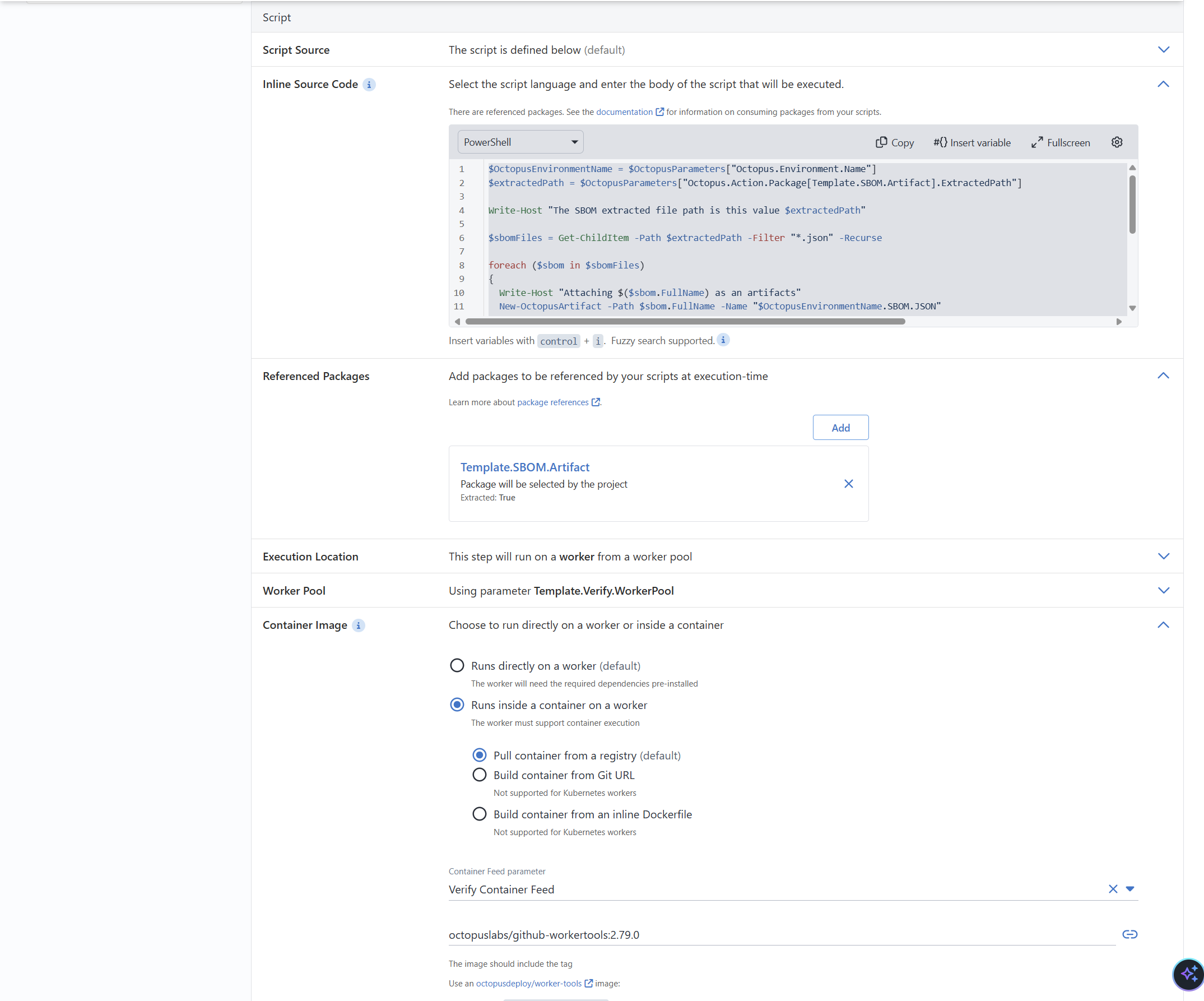
I opted for inline scripts because Octopus Deploy stores Process Templates in git. Referencing a third-party repo felt redundant. Below is the script I used.
$OctopusEnvironmentName = $OctopusParameters["Octopus.Environment.Name"]
$extractedPath = $OctopusParameters["Octopus.Action.Package[Template.SBOM.Artifact].ExtractedPath"]
Write-Host "The SBOM extracted file path is this value $extractedPath"
$sbomFiles = Get-ChildItem -Path $extractedPath -Filter "*.json" -Recurse
foreach ($sbom in $sbomFiles)
{
Write-Host "Attaching $($sbom.FullName) as an artifacts"
New-OctopusArtifact -Path $sbom.FullName -Name "$OctopusEnvironmentName.SBOM.JSON"
Write-Host "Running trivy to scan the SBOM for any new vulnerabilities since the build was run"
trivy sbom $sbom.FullName --severity "MEDIUM,HIGH,CRITICAL" --ignore-unfixed --quiet
if ($LASTEXITCODE -eq 0)
{
Write-Highlight "Trivy successfully scanned the SBOM and no new vulnerabilities were found in the referenced third-party libraries."
}
else
{
Write-Error "Trivy found vulnerabilities that must be fixed before this application version can proceed. Please update the package references and rebuild the application."
}
} Verifying attestations
The second step in the Process Template is much more complex. The initial configuration is similar to the first step. It uses the Template.Git.AuthToken, Template.Verify.Workerpool, and Template.Verify.ExecutionContainer parameters. Just like with the first step, the execution container is hardcoded.
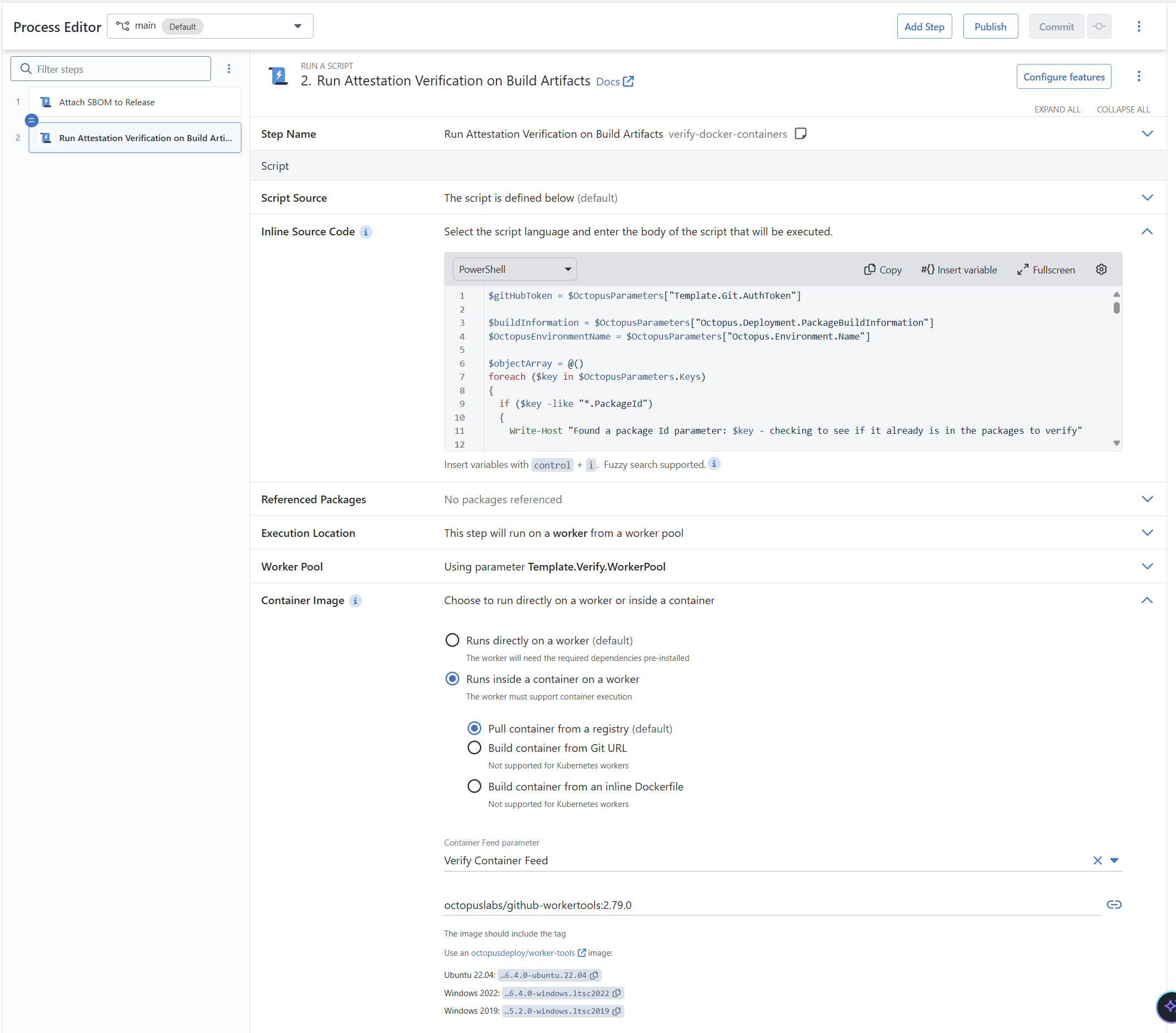
The complexity stems from decisions I made as the producer of the step to make it easier for consumers to use the template.
- Maximum re-use: the Process Template must support 1 to N packages/containers. The consumer shouldn’t need to provide a list of those packages/containers either. That information is stored in the variable manifest.
- The consumer shouldn’t have to hardcode information that is already included in the variable manifest. For example the GitHub repo is stored in the build information variables.
The gh attestation verify command presented two challenges. That command needs a hash to lookup the attestation.
- For zip / JAR / WAR / NuGet files the hash is created from the file itself.
gh attestation verifyrequires the path to the folder. - For containers the digest hash is used. For private container repositories, verification must occur prior to invoking
gh attestation verify.
For my applications, I have the following benefits:
- All services and websites are hosted on Kubernetes clusters.
- All containers publicly accessible on hub.docker.com.
- All deployments to database backends or other services occur via a Kubernetes worker running on the same cluster.
That allowed me to perform a couple of shortcuts unique to my configuration.
- Octopus will download all containers/packages to the same Kubernetes cluster at the start of the deployment.
- Any package (including the SBOM package) needed for the deployment is stored in the
octopus/filesdirectory. - Being public containers on DockerHub, I didn’t have to worry about authentication when pulling the digest for the container.
Below is the PowerShell that works for my configuration. It will require some modifications if you wish to include it in your instance. I’m providing it for example use only.
$gitHubToken = $OctopusParameters["Template.Git.AuthToken"]
$buildInformation = $OctopusParameters["Octopus.Deployment.PackageBuildInformation"]
$OctopusEnvironmentName = $OctopusParameters["Octopus.Environment.Name"]
Write-Host "Getting a list of packages and containers to attest to from the variable manifest"
$objectArray = @()
foreach ($key in $OctopusParameters.Keys)
{
if ($key -like "*.PackageId")
{
Write-Host "Found a package Id parameter: $key - checking to see if it already is in the packages to verify"
$packageId = $OctopusParameters[$key]
Write-Host "The package ID to check for is $packageId"
$packageVersionKey = $key -replace ".PackageId", ".PackageVersion"
Write-Host "The package version key is $packageVersionKey"
$packageVersion = $OctopusParameters[$packageVersionKey]
Write-Host "The package version is $packageVersion"
$packageVersionToVerify = "$($packageId):$($packageVersion)"
if ($objectArray -contains "$packageVersionToVerify")
{
Write-Host "$packageVersionToVerify already exists in the array"
}
else
{
Write-Host "$packageVersionToVerify does not exist - adding it"
$objectArray += $packageVersionToVerify
}
}
}
Write-Host "Getting the GitHub repository from the build information"
$buildInfoObject = ConvertFrom-Json $buildInformation
$vcsRoot = $null
Write-Host "Getting the repo name from build information"
foreach ($packageItem in $objectArray)
{
$artifactToCompare = $packageItem.Trim().Split(':')
$packageVersion = $artifactToCompare[1]
Write-Host "The version to look for is: $packageVersion"
foreach ($package in $buildInfoObject)
{
Write-Host "Comparing $($package.Version) with $($packageVersion)"
if ($packageVersion -eq $package.Version)
{
Write-Host "Versions match, getting the build URL"
$vcsRoot = $package.VcsRoot
Write-Host "The vcsRoot is $vcsRoot"
}
}
}
if ($null -eq $vcsRoot)
{
Write-Error "Unable to pull the build information URL from the Octopus Build information using supplied versions in $packageName. Check that the build information has been supplied and try again."
}
$githubLessUrl = $vcsRoot -Replace "https://github.com/", ""
$env:GITHUB_TOKEN = $gitHubToken
Write-Host "Verifying the attestation of all the found packages and containers."
foreach($packageItem in $objectArray)
{
Write-Host "Verifying $packageItem"
$artifactToCompare = $packageItem.Trim().Split(':')
$packageName = $artifactToCompare[0].Replace("/", "")
if ($packageItem.Contains("/"))
{
$imageToAttest = "oci://$packageItem"
Write-Host "Attesting to $imageToAttest in the repo $githubLessUrl"
$attestation=gh attestation verify "$imageToAttest" --repo $githubLessUrl --format json
if ($LASTEXITCODE -ne 0)
{
Write-Error "The attestation for $packageItem could not be verified"
}
Write-Highlight "$packageItem successfully passed attestation verification"
Write-Verbose $attestation
Write-Host "Writing the attest output to $packageName.$OctopusEnvironmentName.attestation.json"
New-Item -Name "$packageName.$OctopusEnvironmentName.attestation.json" -ItemType "File" -Value $attestation
New-OctopusArtifact -Path "$packageName.$OctopusEnvironmentName.attestation.json" -Name "$packageName.$OctopusEnvironmentName.attestation.json"
Write-Host "Running trivy to check the container for any known vulnerabilities that might have been discovered since the build."
trivy image --severity "MEDIUM,HIGH,CRITICAL" --ignore-unfixed --quiet $packageItem
if ($LASTEXITCODE -eq 0)
{
Write-Highlight "Trivy successfully scanned $packageItem and no new vulnerabilities have been found in the container or base containers since they were built."
}
else
{
Write-Error "Trivy found vulnerabilities in the build artifacts that must be fixed. You can no longer deploy this release. Please update the base container version, rebuild the application, and create a new release."
}
}
else
{
if (Test-Path "/octopus/Files/")
{
Write-Host "$artifactToCompare is a package from our local repo, getting the information from /octopus/Files/"
$zipFiles = Get-ChildItem -Path "/octopus/Files/" -Filter "*$($artifactToCompare[0])*$($artifactToCompare[1])@*.zip" -Recurse
}
else
{
Write-Host "$artifactToCompare is a package from our local repo, getting the information from /home/Octopus/Files"
$zipFiles = Get-ChildItem -Path "/home/Octopus/Files" -Filter "*$($artifactToCompare[0])*$($artifactToCompare[1])@*.zip" -Recurse
}
$artifactVerified = $false
foreach ($file in $zipFiles)
{
if (test-path "$packageName.$OctopusEnvironmentName.attestation.json")
{
Continue
}
Write-Host "Attesting to $($file.FullName) in the repo $githubLessUrl"
$attestation=gh attestation verify "$($file.FullName)" --repo $githubLessUrl --format json
if ($LASTEXITCODE -ne 0)
{
Write-Error "The attestation for $packageItem could not be verified - this means no attestation was generated or the package has been tampered with since it was created - stopping the deployment to avoid a security incident."
}
Write-Highlight "$packageItem successfully passed attestation verification"
Write-Verbose $attestation
$artifactVerified = $true
Write-Host "Writing the attest output to $packageName.$OctopusEnvironmentName.attestation.json"
New-Item -Name "$packageName.$OctopusEnvironmentName.attestation.json" -ItemType "File" -Value $attestation
New-OctopusArtifact -Path "$packageName.$OctopusEnvironmentName.attestation.json" -Name "$packageName.$OctopusEnvironmentName.attestation.json"
}
if ($artifactVerified -eq $false)
{
Write-Error "The attestation for $packageItem could not be verified - this means no attestation was generated or the package has been tampered with since it was created - stopping the deployment to avoid a security incident."
}
}
}Policies
Platform Hub’s Process templates are half of the solution. The other half are Policies. The Policies in Octopus Deploy can fail deployments if specific steps (or Process Templates) are not present. That same logic can be applied to runbook runs, but obviously, they’d require different steps.
How Policies work
I want to explain Policies because they are a new concept in Octopus Deploy. Our policy engine uses Rego to query Octopus Deploy. The end goal of the policy engine is to provide “hooks” into various actions within Octopus Deploy. The first “hook” we provide is executing Deployments or Runbook Runs.
When a Deployment or Runbook Run occurs, Octopus Deploy will send input information to the policy engine that looks similar to the example below.
Input:
{
"Environment": {
"Id": "Environments-42",
"Name": "Test",
"Slug": "test"
},
"Project": {
"Id": "Projects-541",
"Name": "Trident",
"Slug": "trident-aks"
},
"ProjectGroup": {
"Id": "ProjectGroups-483",
"Name": "Kubernetes",
"Slug": "kubernetes"
},
"Space": {
"Id": "Spaces-1",
"Name": "Default",
"Slug": "default"
},
"SkippedSteps": [],
"Steps": [
{
"Id": "azure-key-vault-retrieve-secrets",
"Slug": "azure-key-vault-retrieve-secrets",
"ActionType": "Octopus.AzurePowerShell",
"Enabled": true,
"IsRequired": false,
"Source": {
"Type": "Step Template",
"SlugOrId": "ActionTemplates-561",
"Version": "2"
}
},
{
"Id": "verify-build-artifacts-attach-sbom-to-release",
"Slug": "verify-build-artifacts-attach-sbom-to-release",
"ActionType": "Octopus.Script",
"Enabled": true,
"IsRequired": true,
"Source": {
"Type": "Process Template",
"SlugOrId": "deploy-process-verify-build-artifacts",
"Version": "2.5.0"
}
},
{
"Id": "verify-build-artifacts-verify-docker-containers",
"Slug": "verify-build-artifacts-verify-docker-containers",
"ActionType": "Octopus.Script",
"Enabled": true,
"IsRequired": true,
"Source": {
"Type": "Process Template",
"SlugOrId": "deploy-process-verify-build-artifacts",
"Version": "2.5.0"
}
},
{
"Id": "deploy-k8s-manifest-deploy-container",
"Slug": "deploy-k8s-manifest-deploy-container",
"ActionType": "Octopus.KubernetesDeployRawYaml",
"Enabled": true,
"IsRequired": false,
"Source": {
"Type": "Process Template",
"SlugOrId": "deploy-process-deploy-to-kubernetes-via-manifest",
"Version": "1.1.0"
}
},
{
"Id": "deploy-k8s-manifest-verify-deployment",
"Slug": "deploy-k8s-manifest-verify-deployment",
"ActionType": "Octopus.Script",
"Enabled": true,
"IsRequired": false,
"Source": {
"Type": "Process Template",
"SlugOrId": "deploy-process-deploy-to-kubernetes-via-manifest",
"Version": "1.1.0"
}
},
{
"Id": "notify-team-of-deployment-status",
"Slug": "notify-team-of-deployment-status",
"ActionType": "Octopus.Script",
"Enabled": true,
"IsRequired": false,
"Source": {
"Type": "Step Template",
"SlugOrId": "ActionTemplates-101",
"Version": "15"
}
}
]
}The policy engine will attempt to match that input to a policy. If it matches and the policy passes, then the Deployment (or Runbook Run) can proceed. The policy’s success (or failure) will be logged to the audit log.
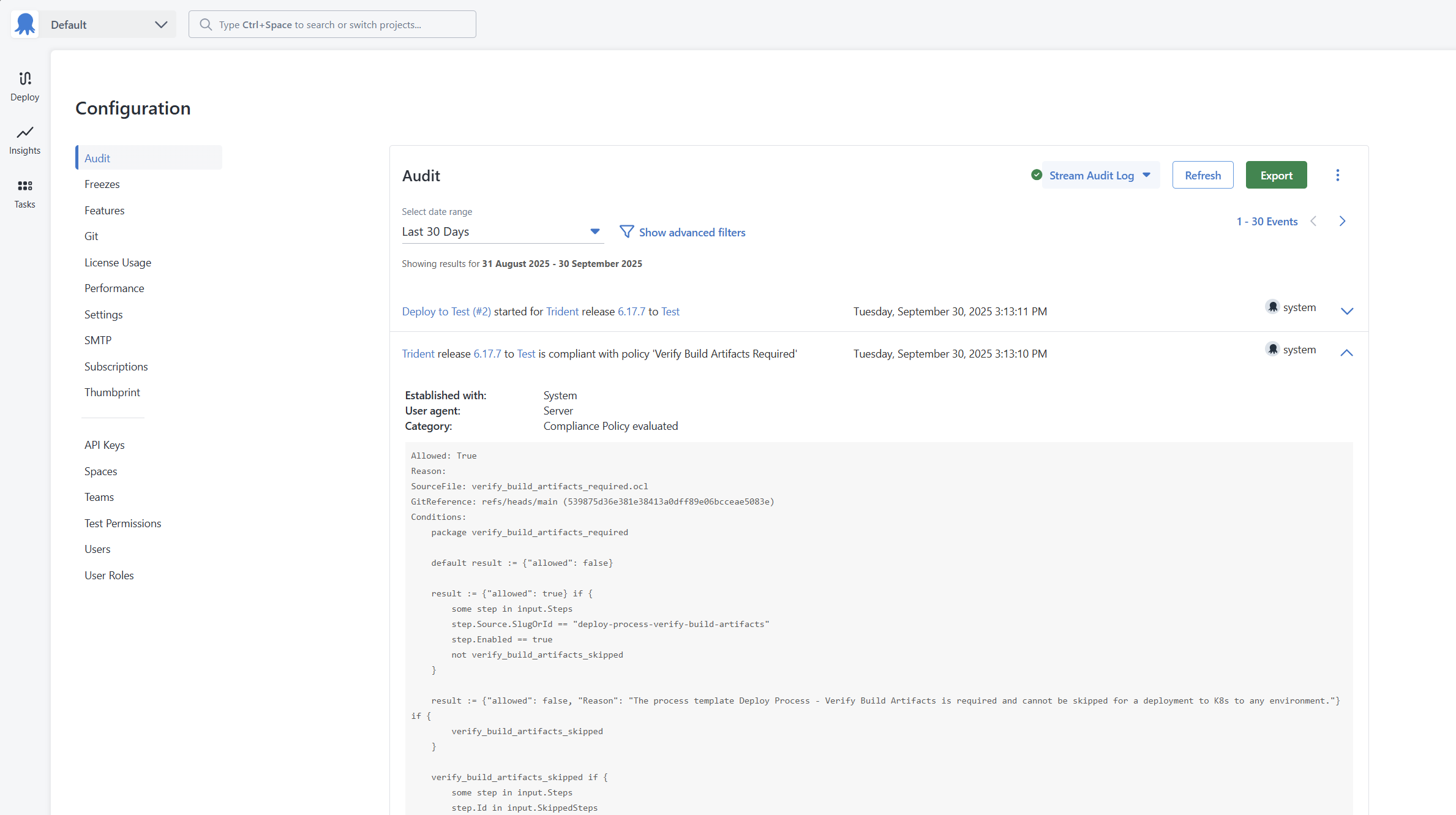
Requiring a Process Template
Using the input from before, the policy to require that the Process Template is as follows:
name = "Verify Build Artifacts Required"
description = "Requires the Process Template Deploy Process - Verify Build Artifacts for all deployments"
ViolationReason = "Deploy Process - Verify Build Artifacts is required on all deployments to K8s"
scope {
rego = <<-EOT
# The package name MUST match the file name that is stored in git. The file name should be verify_build_artifacts_required.ocl
package verify_build_artifacts_required
default evaluate := false
# Only run this policy for deployments in the projects in the Project Group Kubernetes
evaluate := true if {
input.ProjectGroup.Slug == "kubernetes"
not input.Runbook
}
EOT
}
conditions {
rego = <<-EOT
# The package name MUST match the file name that is stored in git. The file name should be verify_build_artifacts_required.ocl
package verify_build_artifacts_required
# Assume all evaluations will fail
default result := {"allowed": false}
result := {"allowed": true} if {
some step in input.Steps
# Match using the source.SlugOrId
step.Source.SlugOrId == "deploy-process-verify-build-artifacts"
# Ensure the step is enabled - if it is not then fail it.
step.Enabled == true
not verify_build_artifacts_skipped
}
result := {"allowed": false, "Reason": "The Process Template Deploy Process - Verify Build Artifacts is required and cannot be skipped for a deployment to K8s to any environment."} if {
verify_build_artifacts_skipped
}
verify_build_artifacts_skipped if {
# Fail the evaluation if the user elects to skip the Process Template when creating the deployment
some step in input.Steps
step.Id in input.SkippedSteps
step.Source.SlugOrId == "deploy-process-verify-build-artifacts"
}
EOT
}Bringing everything together
Adding the Process Template to the deployment process is the same as adding any other step to a deployment process.
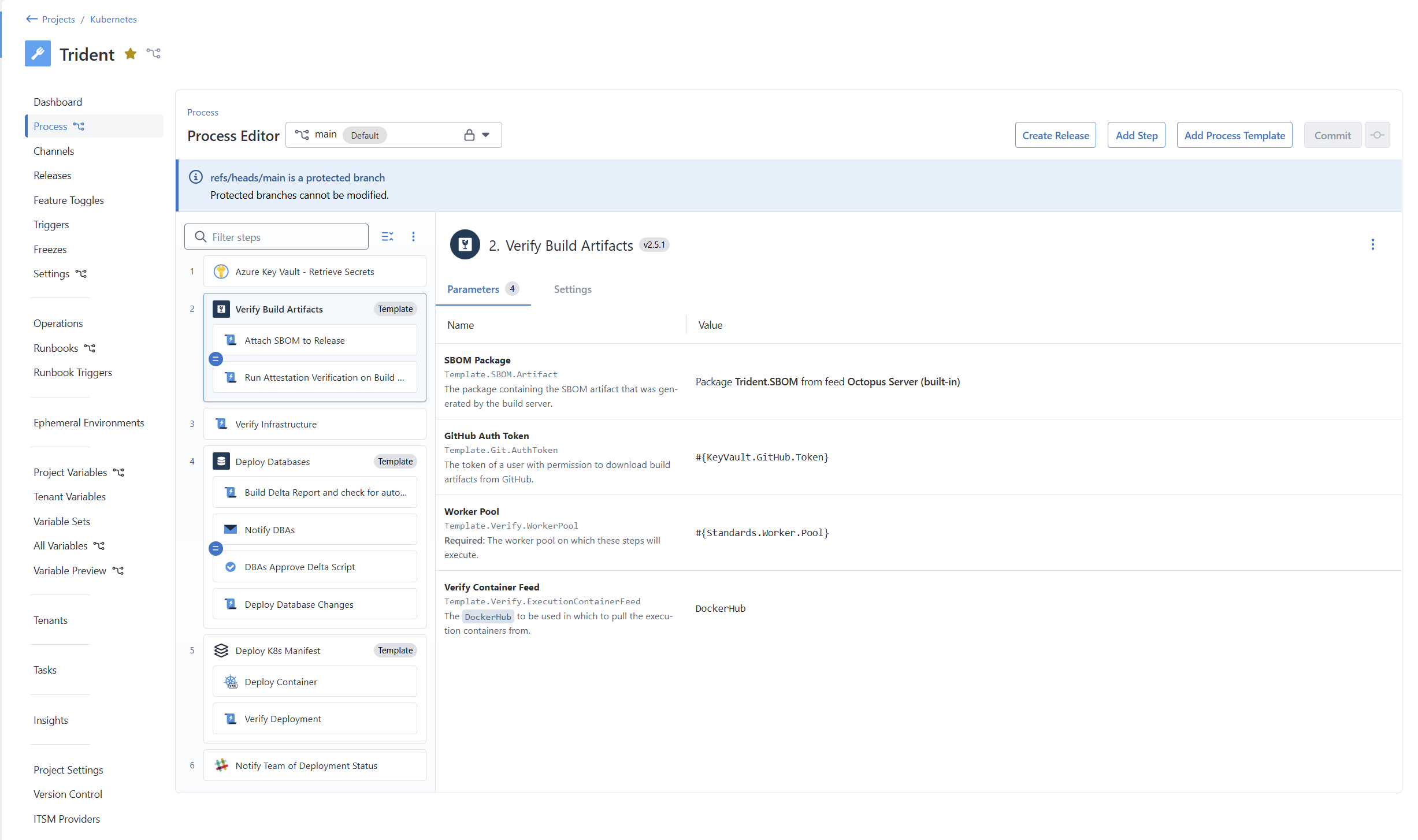
A deployment to the test environment will then show both Policies and Process Templates in action. Because the Process Template is part of the deployment the Policy check passes and the deployment was successful.
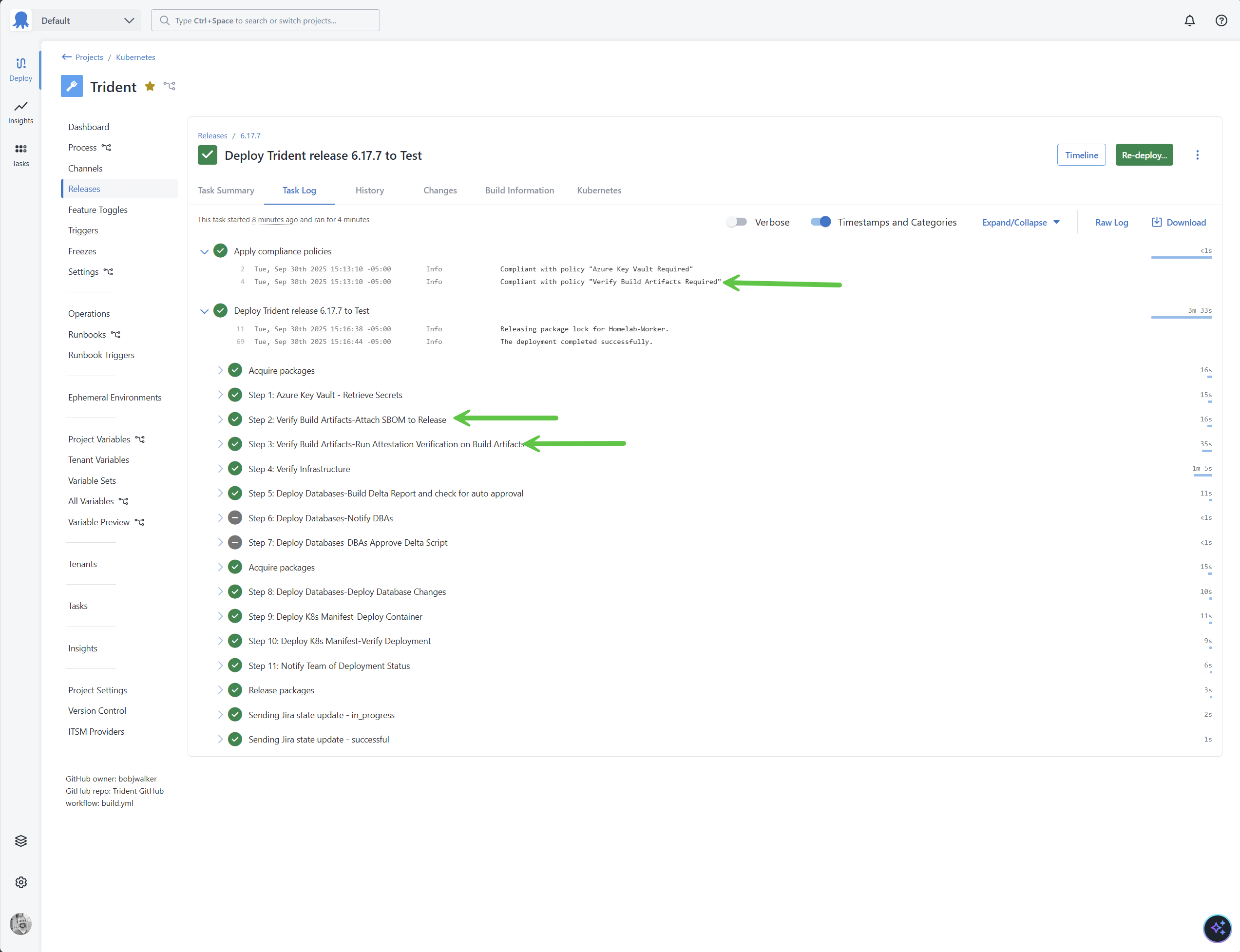
The eagle-eyed among you will likely notice that my scripts fail the deployment when a Trivy scan fails. What if you need to deploy a change to fix a show-stopping bug? I solve that by using guided failures. When Trivy or an attestation verification fails, the deployment pauses and waits for a human to intervene. They decide to ignore the failure or cancel the deployment. Regardless of the decision, that information is logged in the audit log.
Conclusion
I’m not naive enough to believe what is described in this post will 100% secure the software supply chain. Leveraging Process Templates and Policies in Platform Hub makes it much easier to secure the software supply chain in Octopus Deploy. Using Pull Requests in GitHub, Process Templates, Policies, ITSM, and RBAC in Octopus Deploy, it’s much easier to get to SLSA Level 4 than ever before. The Process Template includes the necessary steps to guarantee the build artifact about to be deployed hasn’t been tampered with and no new fixed vulnerabilities have been reported. Policies guarantee that each deployment to production includes the appropriate Process Template.
Happy deployments!


